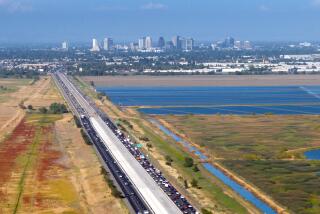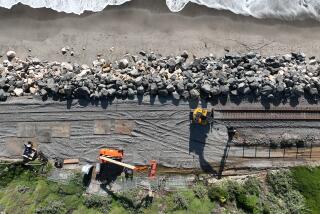Residents, Car Dealers Come to Quiet Resolution
- Share via
To help residents cope with noise from the busy Garden Grove Freeway, county transportation officials agreed Monday to build a sound wall and install a rubberized road surface.
The Orange County Transportation Agency will spent $4 million to muffle noise along a 2-mile stretch of the westbound lanes between Euclid and Magnolia streets in Garden Grove.
Although it has received mixed reviews so far, rubberized asphalt is in use on other freeways in the county and on numerous roads.
Monday’s action resulted from a compromise between residents who wanted traffic noise reduced and nearby car dealerships who said a large sound wall would devastate business by obscuring their car lots from passing motorists.
“It’s a bittersweet victory,” said Ruth Baird, who helped organize neighbors. She said residents had hoped for rubberized lanes on both sides of the freeway.
In addition to the rubberized asphalt lanes, the authority approved building a 3-foot-high sound wall.
Originally, some residents wanted a 14-foot wall, and later said the barrier could be made of plexiglass rather than concrete.
Anything higher than the 3-foot barrier “would devastate the car businesses,” said John A. Sackrison, executive director of the Orange County Automobile Dealers Assn.
“I support the compromise; it’s a good solution,” said Ray Daniels, a spokesman for a Toyota dealership.
County Supervisor Lou Correa, who sits on the agency’s board, met with both sides last week to help broker the compromise.
In Orange County, Caltrans has used rubberized asphalt as a noise reducer on portions of the Santa Ana, Orange and Costa Mesa freeways and Pacific Coast and Imperial highways, a Caltrans official said.
“It doesn’t hold up as well and creates added maintenance costs,” said Pam Gorniak, a Caltrans spokeswoman.
The rubber tends to disintegrate over time, she said.
Some cities have reported good results with rubberized pavement. Lake Forest used it for a widening project on El Toro Road with “great results,” said Councilman Richard Dixon, who is on the authority’s board of directors.
With Monday’s decision, the project will be part of a five-year demonstration to measure whether freeway noise is reduced and if the rubberized asphalt holds, Correa said.
More to Read
Sign up for Essential California
The most important California stories and recommendations in your inbox every morning.
You may occasionally receive promotional content from the Los Angeles Times.













